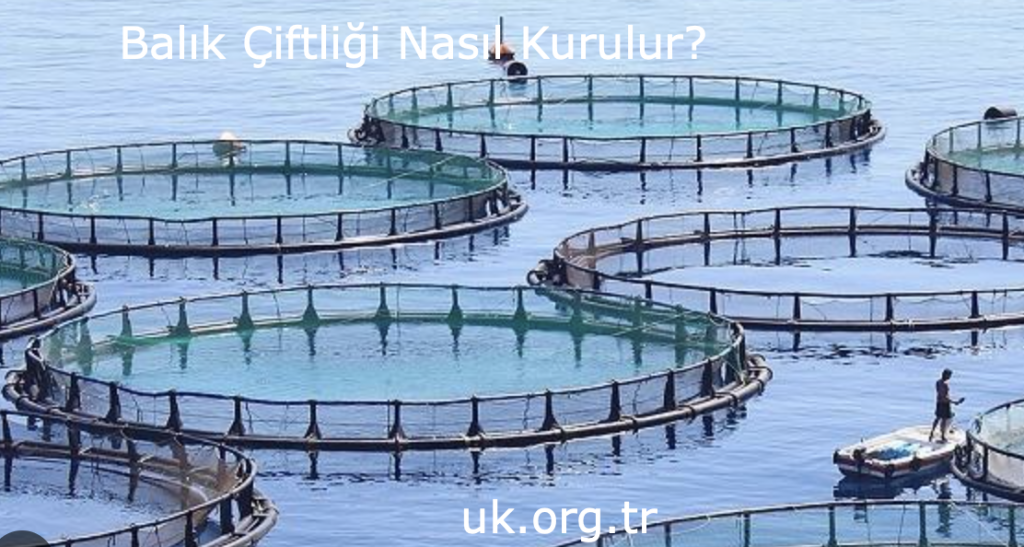Balık çiftliği kurmak, ticari bir balık yetiştiriciliği işine girişmek isteyenler için çeşitli adımları içeren karmaşık bir süreçtir. İşte balık çiftliği kurma sürecinin temel adımları:
- İş Planı Hazırlama:
- İlk olarak, iş planınızı hazırlayın. Bu plan, işletmenizin hedeflerini, finansman gereksinimlerini, pazar araştırmalarını ve karlılık tahminlerini içermelidir.
- Uygun Konumu Seçme:
- Balık çiftliği için uygun bir konum seçin. Balık çiftliği için uygun bir arazi veya su kaynağına ihtiyacınız vardır. Su kalitesi, iklim koşulları ve altyapı konum seçiminde önemli faktörlerdir.
- İzin ve Düzenlemeler:
- Balık çiftliği kurmak için gerekli izinleri ve lisansları almalısınız. Yerel, eyalet ve ulusal düzeydeki su kaynakları ve çevre yönetmeliklerine uymalısınız.
- Altyapı ve Ekipmanlar:
- Balık çiftliği altyapısını oluşturun. Bunlar arasında havuzlar, su temini ve drenaj sistemleri, su kalitesi izleme cihazları, yem depoları ve otomasyon ekipmanları yer alabilir.
- Balık Türünü Seçme:
- İşletmenizin hangi tür balıkları yetiştireceğinizi seçin. Ticari balık yetiştiriciliği için sıklıkla tercih edilen türler somon, alabalık, karides, tilapia ve su ürünleri içerebilir.
- Yavru Balık Temini:
- İşe yavru balıkları temin etmekle başlayın. Yavru balıklar, işletmenizin temel varlıklarından biridir.
- Yetiştirme Süreci:
- Balıkları yetiştirmek ve bakmak için gereken süreçleri izleyin. Bu, balık yemi beslemek, su kalitesini izlemek ve hastalık kontrolü yapmayı içerir.
- Hasat ve Pazarlama:
- Balıkları büyüttüğünüzde, hasat edin ve pazarlamaya başlayın. Pazarlama stratejileri ve dağıtım kanalları oluşturun.
- İşletmeyi Yönetme:
- İşletmenizin günlük yönetimini ve finansal işlemlerini takip edin. Giderleri kontrol edin ve karlılığı izleyin.
- Eğitim ve Araştırma:
- Kendinizi ve çalışanlarınızı balıkçılık alanında eğitin. Yenilikçi yetiştirme tekniklerini ve su kalitesi izleme yöntemlerini araştırın.
Balık çiftliği işletmek ciddi bir yatırım ve uzun vadeli bir taahhut gerektirir. İşletmenin başarılı olabilmesi için dikkatli bir planlama ve sürekli bakım gerektirir. Ayrıca, yerel düzenlemelere, çevresel etkilere ve pazar taleplerine dikkat etmek önemlidir. Bu nedenle iş planınızı ve yerel düzenlemeleri dikkatlice incelemek ve gerekli uzmanlardan destek almak çok önemlidir.

Balık Çiftliği Devletin Verdiği İmkanlar
Balık çiftliği işletmelerine yönelik devlet destekleri, ülkenizin bulunduğu coğrafi konum ve yerel düzenlemelere bağlı olarak değişebilir. Ancak genel olarak, birçok ülke, balıkçılık sektörünü desteklemek ve sürdürülebilir balıkçılık uygulamalarını teşvik etmek için bazı yardımlar ve teşvikler sunmaktadır. İşte bu tür yardımlardan bazıları:
- Hibe Programları: Devletler, balıkçılık işletmelerine hibe programları aracılığıyla mali destek sunabilirler. Bu hibeler, yeni balık çiftliği kurma, mevcut işletmeleri geliştirme, su kalitesi kontrol sistemleri kurma veya çevre dostu uygulamaları benimseme gibi projeler için kullanılabilir.
- Düşük Faizli Krediler: Balık çiftliği işletmeleri için düşük faizli kredi programları da sunulabilir. Bu krediler, işletmenizi büyütmek veya yenilemek için kullanmanıza yardımcı olabilir.
- Eğitim ve Danışmanlık: Devletler, işletme sahiplerine ve çalışanlara balıkçılık uygulamaları ve su kalitesi yönetimi konularında eğitim ve danışmanlık hizmetleri sunabilirler.
- Araştırma ve Geliştirme Destekleri: Devletler, balık çiftliği işletmelerinin daha etkili ve sürdürülebilir uygulamalar benimsemelerini teşvik etmek için araştırma ve geliştirme projelerine finansman sağlayabilirler.
- Vergi Teşvikleri: Vergi teşvikleri, balık çiftliği işletmelerinin belirli harcamaları veya yatırımları için vergi avantajları sağlayabilir. Örneğin, enerji verimli ekipmanların alımı veya su arıtma tesislerinin kurulumu için vergi indirimleri sunulabilir.
- Çevre Dostu Uygulama Teşvikleri: Sürdürülebilir balıkçılık uygulamalarını teşvik etmek için, işletmelerin çevre dostu yöntemlere geçiş yapmaları durumunda teşvikler sunulabilir.
- Pazarlama ve İhracat Desteği: Balık çiftliği ürünlerini ulusal ve uluslararası pazarlarda tanıtmak ve ihraç etmek isteyen işletmelere pazarlama ve ihracat desteği sağlanabilir.
- Sürdürülebilirlik Sertifikasyonları: Bazı ülkeler, balık çiftliği işletmelerine sürdürülebilirlik sertifikaları kazanmaları için teşvikler sunarlar. Bu sertifikalar, işletmelerin sürdürülebilir uygulamalara uygunluğunu doğrular.
Balık çiftliği işletmeleri, yerel ve ulusal düzeydeki resmi kurumlarla iletişime geçerek, mevcut destek ve teşvik programları hakkında daha fazla bilgi alabilirler. Ayrıca, bu tür desteklere başvururken, projenizin yerel düzenlemelere ve gerekliliklere uygun olması önemlidir.
- Erzincan’da Yeni Kahve Noktası: EspressoLab Heyecanı Başladı! - 24 Eylül 2025
- DHI Saç Ekimi Hakkında Merak Edilenler - 12 Eylül 2025
- Protez Saç Nedir? - 31 Ağustos 2025




